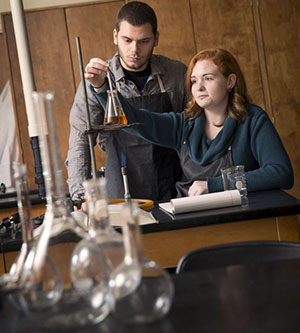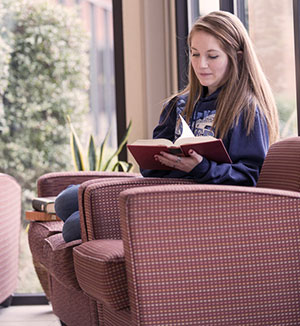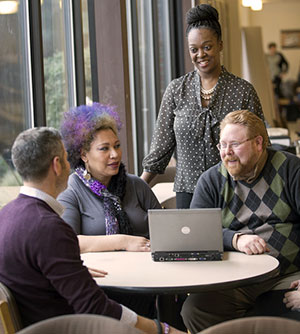 The over-educated and under-employed liberal arts graduate is a trope commonplace in American society today. Graduates face a career landscape that is markedly different than the one the previous generation found after college. Recently, the National Center for Higher Education Management Systems and the Associate of American Colleges and Universities published a report titled, “How Liberal Arts and Sciences Majors Fare in Employment.” The report is based on an analysis of U.S. Census and other economic data, and provides a broad view of employment outcomes for recent graduates, as well as for more experienced workers.
The over-educated and under-employed liberal arts graduate is a trope commonplace in American society today. Graduates face a career landscape that is markedly different than the one the previous generation found after college. Recently, the National Center for Higher Education Management Systems and the Associate of American Colleges and Universities published a report titled, “How Liberal Arts and Sciences Majors Fare in Employment.” The report is based on an analysis of U.S. Census and other economic data, and provides a broad view of employment outcomes for recent graduates, as well as for more experienced workers.
Of those surveyed, 4 out of 5 employers agree that all students acquire broad knowledge in the liberal arts and sciences. When asked to identify the ranges of knowledge and skills that are important for recent graduates wanting to pursue advancement and long-term career success at their company, 55% of employers indicated that they want employees with both field specific and broad range knowledge and skills. Finally, 93% of employers agree that candidates’ demonstrated capacity to think critically, communicate clearly, and solve complex problems is more important than their undergraduate major.
 All of this data gets to the heart of what many who work in higher education already know, the most valuable outcome of a bachelor’s degree is cultivating the habits of lifelong learner. This is intrinsic to the experience found at Warner Pacific, which is dedicated to providing students from diverse backgrounds an education that prepares them to engage actively in a constantly changing world. Of course, a mission statement is only powerful if it is lived out. So, we caught up with five alumni and asked them to share their thoughts on the value of a Warner Pacific education.
All of this data gets to the heart of what many who work in higher education already know, the most valuable outcome of a bachelor’s degree is cultivating the habits of lifelong learner. This is intrinsic to the experience found at Warner Pacific, which is dedicated to providing students from diverse backgrounds an education that prepares them to engage actively in a constantly changing world. Of course, a mission statement is only powerful if it is lived out. So, we caught up with five alumni and asked them to share their thoughts on the value of a Warner Pacific education.
The Rev. Andria (Cotton) Skornik,’05, earned her degree in Communication Arts and now serves as Assistant Priest in an Episcopal parish outside of Chicago. “My experience at Warner Pacific was great preparation for becoming a preacher,” shares Skornik. “On any given Sunday, I have the challenge of keeping people awake and engaged, exploring issues in their difficulty and complexity, and making a case for hope and redemption without resorting to easy answers. A big part of the Humanities Core at the College is about making connections across disciplines, articulating issues in terms of paradox, and learning to craft a compelling argument, all of which are essential to the art of preaching.”
The lessons learned in the classroom combined with the deeply relational nature of the campus were vital to Skornik as a young student. “A significant part of my discernment to the priesthood began while I was at
Warner Pacific. I remember many office visits with professors, agonizing over what I should do with my life. They didn’t give me ‘the answer’ but they helped me think about my gifts and interests in relationship to the issues I cared about.”
 The work that Rev. Skornik gets most excited about today was first cultivated during her time at the College. “The philosophy seminar on community was where I realized that I wanted to create communal spaces and opportunities for people to engage in the kinds of conversations we were having in that class,” Skornik explains. “Today, I am able to enjoy a calling that includes creating spaces where people feel connectedness to God and others.”
The work that Rev. Skornik gets most excited about today was first cultivated during her time at the College. “The philosophy seminar on community was where I realized that I wanted to create communal spaces and opportunities for people to engage in the kinds of conversations we were having in that class,” Skornik explains. “Today, I am able to enjoy a calling that includes creating spaces where people feel connectedness to God and others.”
Roy Adams, ’09, is discovering the benefits of his
Warner Pacific education on the battlefield as an Emergency Care Sergeant in the Army. “There are many experiences that I can point to that shaped my life while attending the College,” says Adams. “Perhaps the hardest hitting moment came during my junior year while taking one of Terry Baker’s philosophy classes.”
“I thought that my grade was good enough to finish the term with a C, and neglected to do an assignment. But, when the final grades were posted, mine was not passing. Professor Baker called me to his office and informed me that the one assignment was required for the class. I pleaded with him, noting how this would make me ineligible to run track in the spring. He understood, but saw that it was an important life lesson for me to learn that actions have consequences, and ultimately we are accountable for our own choices. In the face of losing my athletic scholarship and having to drop out of school, I rose above the adversity and found a way to take an online class. This fortitude, inspired by my professor, led to a great year for me academically and athletically.”
This type of real-world preparation is a key component to Adams’ personal and professional success in the military, where he trains and mentors Army Paratroopers in medical and combat skills. “I had wanted to be a soldier ever since I was a child,” shares Adams. “Being out of the classroom for five years, I cannot immediately recall some of the ‘book smarts’ a college degree requires; however, every day I utilize the critical thinking, communication, and leadership skills that I developed during my time at Warner Pacific.”
Ruby Mitchell, ’09, is currently pursuing a master’s degree in social work and found her calling serving overseas as well, through her time in the Peace Corps. After earning a B.A. in Cross Cultural Ministry, Mitchell found herself using her undergraduate experience immediately upon graduation. “I walked away from Warner Pacific with a solid liberal arts education, and four years of experience of living in a small community,” Mitchell explains.
“Being in the Peace Corps demanded nothing less than these two components. By the time I was placed in my own village with a two-year assignment to work on youth development, I was familiar with the pace and intimacy of close community. I knew the importance of my own conduct and reputation; I also knew the importance of treating others with respect and consideration. The breadth of coursework provided foundational knowledge for any type of class or project that my community could want. It was learning to ‘continuously learn’ that made it possible to tackle everything from planting gardens to teaching nutrition or developing English activities.”
Of course, it was more than just the time spent in the classroom that shaped Mitchell. “At the end of my sophomore year I went on a Missions@WP trip with Dr. John and Gwen Johnson, two other students, and president emeritus, Jay Barber. We were in Myanmar, a country where the men wear a traditional long skirt called a lungyi. President Barber was given one as a gift, and wore it during a lesson that he taught on Elijah. I will never forget him demonstrating the story of Elijah ‘girding up his loins’ and running to Jezreel by hiking up his own lungyi and jogging across the stage, to the shock and joy of everyone attending,” Mitchell recalls fondly. “It was a moment of comedy and a moment of cultural exchange. It was also a moment when I was witness to the complex blends of humility, wisdom, and humor needed for effective cross-culture work.”
Earning a degree may not necessarily be the starting point of a career, often it is the next step on a path that has already begun. Bill Hall, ’13, knows that better than most. Hall, who earned his B.A. in Business Administration, is the Director of Services at Swagelok Northwest, a national producer and distributor of fluid system support. For Hall, the convenience of the Adult Degree Program (ADP) was a primary factor in choosing to complete his degree. “The one night a week format really appealed to me as a working adult with a family. It allowed me to maintain family time and study at times that had less impact on my wife and daughters.”
“I was working in this field prior to attending Warner Pacific but earning my degree allowed me the opportunity to advance,” explains Hall. “The program prepared me with the skills I needed to advance in my company to the highest level under the president. I am now a trusted advisor, which would have not been possible without the opportunity to earn my degree at Warner Pacific.”
The relational nature of his ADP cohort made an impact on Hall. “The bond that was created with my learning team was truly amazing. I thought we would get through the classes and go our separate ways but we are still in touch a year after graduation. Great friendships were formed! The openness and brutal honesty that was shared is a testament to the design of the classroom format.”
Gretchen Bossio, ’07, ’08, has discovered that her training opened doors to a career that she had never expected. Bossio, who earned her bachelor’s degree in Administration of Nonprofit Organizations, and a master’s in Management and Organizational Leadership, is a wife, mother, and freelance writer. When asked to explain how her educational experience has prepared her for life today, Bossio sees God’s hand at work. “My most important role is the one I play in my family. Although I attended Warner Pacific for education and training in a professional manner, I walked away with the confidence to embrace whatever work God led me to fulfill. In this season of my life, that work is primarily being a wife and mother. It is more rewarding and exhausting than I could have ever imagined, and I daily call on the Lord for grace as I aim to grow in my marriage and motherhood. In the evenings, I am a blogger and work on freelance projects for a number of parenting websites including ‘Baby Gizmo’, ‘What to Expect’, and ‘Natural Parents Network’. My passion for motherhood blends beautifully with these writing opportunities.”
Through conversations with each of these alumni, one thing becomes clear; a liberal arts education should not be seen as a golden ticket promising the future of your dreams. Rather, the experience of being nurtured within a relational, liberal arts environment provides you with a well-stocked toolbox, ready to serve you in building a promising future, wherever God may lead. Gretchen Bossio agrees, “…the pivotal years I spent at Warner Pacific influenced my career path greatly; first working in nonprofits, then in sales, and currently in my lifelong calling as a mom and in my hobby-turned-part-time-career in freelance writing. Higher education opens doors. Even more, having a degree where I practiced thinking outside of the box rather than just memorizing and reciting facts, has allowed me to flourish in each of my various positions. Warner Pacific equips students with foundational skills to thrive and traverse a world that is constantly changing while also staying very much the same. How’s that for a paradox?”
by Melody Burton
